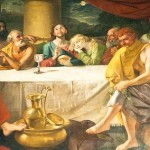 1 Corinthians 10:23-11:1
1 Corinthians 10:23-11:1
It’s time again for Erlandson’s Special and General Theories of Sacramentality. If you’ve been reading Give Us This Day for a while, you might remember that Erlandson’s Special Theory of Sacramentality states that God’s grace is communicated through and visibly signified by His special Sacraments of Baptism and Communion, if faithfully received.
Erlandson’s General Theory of Sacramentality states that God’s grace is generally communicated through and visibly signified by His all of His creation, if faithfully received, with thanksgiving.
St. Paul began his discussion of the Sacraments and God’s special presence and grace in His covenant meal earlier in Chapter 10 and will return to it in greater detail in Chapter 11 (the Special aspect of the Sacraments). But here at the end of Chapter 10 he discusses the General aspect of the sacramental worldview. The two may be tied together the word “thanksgiving.” The Eucharist (Greek for “thanksgiving”) was the most common term for the Lord’s Supper or Sacraments in the early church, and here in verse 30 Paul emphasizes the importance of thanksgiving for every good gift of which we partake. Though he’s speaking especially of food offered to idols in verse 30, he makes clear in verse 31 that we are to do whatever we do to the glory of God, and that includes the giving of thanks.
Paul begins this section by saying that “All things are lawful for me” (verse 23.) Now obviously Paul doesn’t mean all things, because some things are sinful. But these things that are sinful are rarely the things themselves but the use to which they are put: sex, money, possessions, time, intelligence, the will, etc. All of these things were created good, and if they are used for godly purposes are to be enjoyed and received with thanks.
“The earth is the Lord’s and all its fullness” (verse 28, quoting Psalm 24:1.) All things belong to God and come from God, and God created them good and for our use. We were created to enjoy the kindly fruits of the earth, and that divine purpose of God in His creation and for man has never been revoked. But in partaking of the earth and the food of the earth, man is partaking of God and His good gifts. This was to be understood from the beginning.
But when Adam and Eve fell, their fall was not just in the single act of disobedience but also in thinking that they could enjoy the good things of life, the fruits of the earth, without reference to God. They thought that eating the fruit of the Tree of Knowledge of Good and Evil would be good for them because the goodness somehow resided in the fruit itself, and not God Himself.
Big Mistake!!!
This is why thanksgiving is so essential to our properly receiving God’s good gifts. Thanksgiving, eucharist, means that we acknowledge the earth to be the Lord’s and that He is the giver of every good gift, and not we ourselves or Mother Earth herself (which are both forms of idolatry.)
So far from being a Puritan like some might think Paul is (and even the Puritans weren’t Puritans as we think they were!), Paul expects us to enjoy the good things of the earth.
And so I am to enjoy it whenever I put on Vivaldi’s Mandolin Concerti or the Electric Prunes’ Mass in F Minor; or am eating a deep-dish pepperoni pizza from Pizza Hut; or see a double rainbow appear; or teach my daughter to say “Da-Da!” while she thumps my chest; or sip some decaf coffee with Jackie after the kids have gone to bed; or use the Internet to help complete a Ph.D. thesis (and occasionally check the price of Ebay items while listening to a radio station I created). (Hey: this is my list so I get to choose the things I like!)
God and His goodness come to me through each of these things in my life so that all of life becomes a kind of lesser sacrament that brings God to me. I’m also to give thanks to God who has given each of these things and much more.
But our freedom to enjoy God’s good gifts has one important limitation, and that limitation is love. We are not allowed to use our liberty to eat all foods (for example) to harm others. There are plenty of things I can enjoy in life, and I can do without any of them if enjoying them means hurting someone else.
But there’s more to it than this. We also must use God’s good gifts for the good of others. Sometimes, though I have a “right” to enjoy the good things of the earth, I am not to spend them on myself. It would be easy to justify being a hedonist based on what I’ve listed above. It would be easy to take all of the good things God has given me and to use them on myself.
The first problem with this, though, is that I’m likely to be seduced by these good things and begin believing that I have a divine right to them and that I’ve earned them, leaving God out of the picture. The second problem is that one of the reasons God has blessed me with these things is so that I may share them (and thereby God) with others.
What if St. Paul had spent all his time learning to become a connoisseur of fine wines and a gourmand, a spectator at the games, and a master of the intricacies of the Jerusalem Stock Exchange? All things are lawful for him, and the earth is the Lord’s and all its fullness, he could quote.
But not all things are edifying for us (verse 23.) “Let no one seek his own, but each one the other’s well-being” (verse 24.) “I also please all men in all things, not seeking my own profit, but the profit of many, that they may be saved” (verse 33.)
So it’s good to enjoy the good gifts of God that He brings to us through His world. But love constrains us as well to seek the good of others and not only our own. There may be some among us who are too “ascetic” and denying of the good things of the earth. But in our culture, I think the greater temptation is to let the good things of this life (good though they may be) seduce us away from serving God and others in love.
Whether enjoying the good things in life or serving others (which we should begin to see as one of the best things in life), in all things we are to glorify God and to give thanks to Him by whom, for whom, and through whom all things exist.
Prayer: Heavenly Father, from whom comes every good and perfect gift, I give thanks to You today for the good gifts of the earth which you offer to me every day. I thank You especially for the heavenly food of Your Son and ask that in all I receive today I will be thankful. Help me to receive these gifts not only for my enjoyment but also for the good of others that, in love, I might help lead others to You.
Points for Meditation:
- Are you more prone to see life as a religious duty or a smorgasbord? Whichever is your greater tendency, meditate on God’s will for the other one in your life.
- Make a list of things to give thanks to God for, and keep the list handy.
- What could you do to help yourself see that seeking the good of others is one of God’s good gifts?
Resolution: I resolve to practice giving thanks to God today for His good gifts.
© 2015 Fr. Charles Erlandson
















